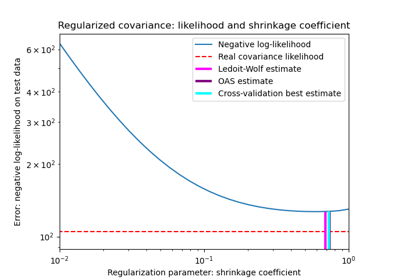sklearn.covariance.empirical_covariance¶
- sklearn.covariance.empirical_covariance(X, *, assume_centered=False)[source]¶
Compute the Maximum likelihood covariance estimator.
- Parameters:
- Xndarray of shape (n_samples, n_features)
Data from which to compute the covariance estimate.
- assume_centeredbool, default=False
If
True, data will not be centered before computation. Useful when working with data whose mean is almost, but not exactly zero. IfFalse, data will be centered before computation.
- Returns:
- covariancendarray of shape (n_features, n_features)
Empirical covariance (Maximum Likelihood Estimator).
Examples
>>> from sklearn.covariance import empirical_covariance >>> X = [[1,1,1],[1,1,1],[1,1,1], ... [0,0,0],[0,0,0],[0,0,0]] >>> empirical_covariance(X) array([[0.25, 0.25, 0.25], [0.25, 0.25, 0.25], [0.25, 0.25, 0.25]])
Examples using sklearn.covariance.empirical_covariance¶

Shrinkage covariance estimation: LedoitWolf vs OAS and max-likelihood
Shrinkage covariance estimation: LedoitWolf vs OAS and max-likelihood
